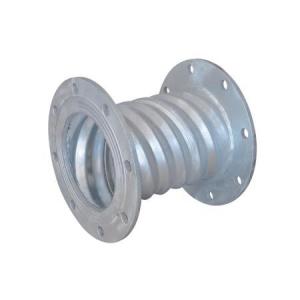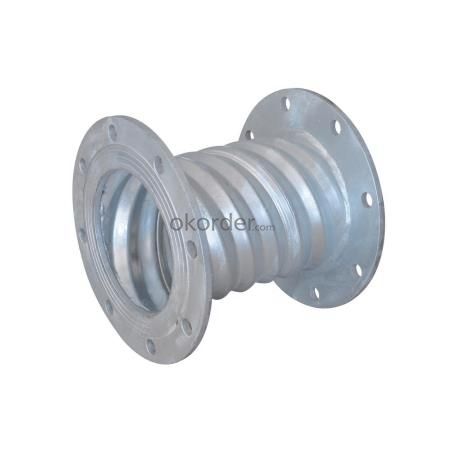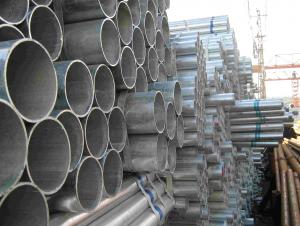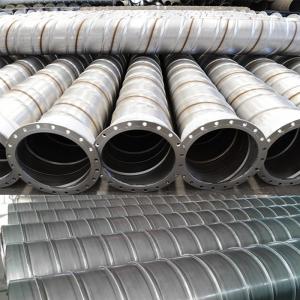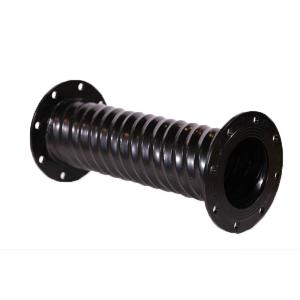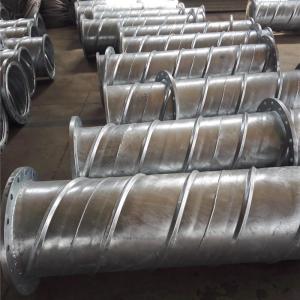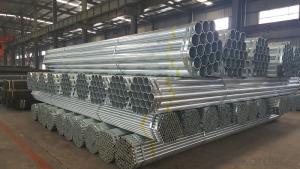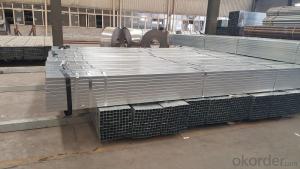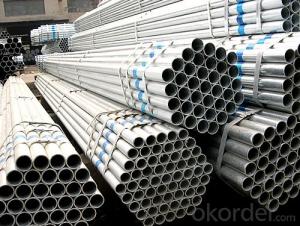Underground Spiral Welded Corrugated Galvanized Steel Pipe for Mining
- Loading Port:
- China main port
- Payment Terms:
- TT or LC
- Min Order Qty:
- 10 m
- Supply Capability:
- 10000 m/month
OKorder Service Pledge
OKorder Financial Service
You Might Also Like
Underground Spiral Welded Corrugated Galvanized Steel Pipe for Mining
Press grade: Maximum PN -0.097MPa
Size: DN200MM-DN800MM
Features:


Specification
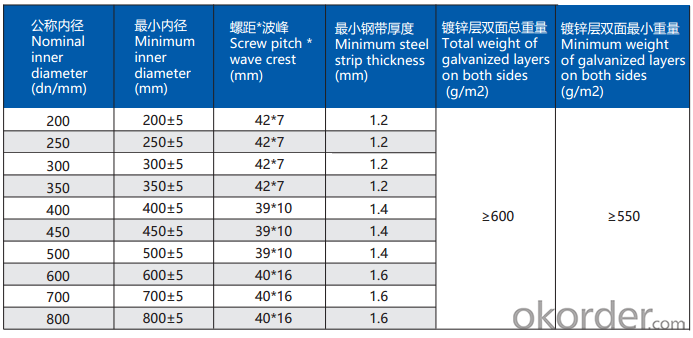
We own three industry bases for manufacturing pipes, fittings and new materials, including the biggest production line of steel wire reinforced PE composite pipe in the world, and top advanced PE pipe production line.
We get long term cooperation with leading material suppliers in the world and professionally provide the pipeline system solutions of matched products and technical cases by the whole industry chain from materials R&D to pipeline engineering installation.
- Q: What are the different types of supports used for steel pipes in buildings?
- Some common types of supports used for steel pipes in buildings include pipe hangers, clamps, brackets, and roller supports. These supports are designed to provide stability, prevent sagging or bending, and distribute the weight of the pipes evenly. The choice of support depends on factors such as pipe size, location, and load requirements.
- Q: How do steel pipes handle chemical exposure?
- Steel pipes are renowned for their excellent ability to resist exposure to chemicals. The strength and durability of steel make it a dependable material for managing different types of chemicals. Steel pipes can endure contact with a diverse array of corrosive substances like acids, alkalis, solvents, and gases without undergoing significant degradation or damage. One of the primary factors contributing to the effectiveness of steel pipes in handling chemical exposure is their innate resistance to corrosion. Steel naturally resists corrosion and can create a protective oxide layer on its surface, which acts as a barrier against chemical attack. Additionally, steel pipes can be coated or lined with materials that have corrosion-resistant properties, such as epoxy, polyethylene, or cement, to offer additional defense against aggressive chemicals. Furthermore, steel pipes find widespread use in industrial settings where they encounter various chemicals. They are extensively employed in chemical plants, refineries, water treatment facilities, and other industries that require the transportation or storage of chemicals. Steel pipes can withstand the high pressures and temperatures associated with these processes while retaining their structural integrity and resistance to chemicals. However, it is important to acknowledge that the resistance of steel pipes to chemical exposure may vary depending on the specific type and concentration of the chemical. Certain highly corrosive substances may necessitate additional measures, such as specialized coatings or alloys, to ensure long-term protection. In conclusion, steel pipes are generally well-suited for managing chemical exposure due to their inherent resistance to corrosion, durability, and versatility. Their capability to endure a wide range of corrosive substances makes them a trustworthy choice for diverse industrial applications involving the transportation and storage of chemicals.
- Q: How are steel pipes used in the manufacturing of chemical processing plants?
- Steel pipes are commonly used in the manufacturing of chemical processing plants due to their durability, high strength, and resistance to corrosion. These pipes are typically used for the transportation of various chemicals, gases, and liquids within the plant. They help maintain the integrity of the materials being processed and ensure the safe and efficient operation of the plant.
- Q: How are steel pipes used in the manufacturing of marine applications?
- Steel pipes are commonly used in the manufacturing of marine applications due to their durability and resistance to corrosion. They are used for various purposes such as constructing ship hulls, offshore platforms, and underwater pipelines. These pipes provide structural support and can withstand the harsh conditions of the marine environment, making them essential components in the manufacturing process of marine applications.
- Q: How are steel pipes used in the aerospace manufacturing industry?
- Steel pipes are used in the aerospace manufacturing industry for a variety of applications, including fuel and hydraulic systems, structural components, and engine parts. They provide durability, strength, and corrosion resistance, ensuring the safety and reliability of aircraft.
- Q: Are steel pipes suitable for underground gas lines?
- Yes, steel pipes are suitable for underground gas lines. Steel pipes are known for their strength and durability, making them a reliable choice for underground gas distribution. They have high resistance to external factors such as corrosion and impact, which is important for maintaining the integrity of the gas system. Additionally, steel pipes can withstand high pressure and temperature variations, ensuring the safe and efficient transportation of gas underground. However, it is important to note that proper installation techniques, such as corrosion protection measures, should be followed to ensure the longevity of the steel pipes and prevent any potential leaks or accidents.
- Q: How can galvanized steel pipe be connected with stainless steel pipe?
- Attention should be paid to the zinc coating at the side of the groove before welding. It is OK to brush silver powder after welding. There is a lot of information about the welding of carbon steel and stainless steel. Just check it online.
- Q: What are the typical lengths of steel pipes?
- The typical lengths of steel pipes vary depending on their intended use and application. However, common lengths for steel pipes range from 18 to 24 feet (5.5 to 7.3 meters).
- Q: How do steel pipes differ from other types of pipes?
- Steel pipes possess several distinct characteristics that set them apart from other pipe types. Primarily, their strength and durability are well-known. They exhibit remarkable resistance to heat, pressure, and corrosion, rendering them suitable for numerous applications. Additionally, their robustness allows them to bear heavy loads and offer an extended service life. One distinguishing feature of steel pipes lies in their versatility. They can be manufactured in various shapes and sizes to fulfill specific project requirements. This adaptability has contributed to their popularity across a diverse range of industries, including construction, oil and gas, water treatment, and manufacturing. Moreover, steel pipes exhibit exceptional thermal conductivity, facilitating efficient heat transfer between different areas. Consequently, they prove suitable for applications involving heating and cooling systems, as well as the transportation of hot fluids or gases. Furthermore, steel pipes are renowned for their resistance to fire. They possess a high melting point and are not easily ignited or conducive to the spread of flames. This characteristic is particularly critical in applications where fire safety is a concern, such as buildings or industrial facilities. Lastly, although steel pipes may entail a higher initial cost compared to other pipe types, their long-term benefits, such as durability and low maintenance requirements, often outweigh the initial investment. Additionally, steel pipes are highly recyclable, making them an environmentally friendly choice. In summary, steel pipes stand out due to their strength, durability, versatility, excellent thermal conductivity, fire resistance, and recyclability. These remarkable qualities establish steel pipes as the preferred option for a wide range of applications across various industries.
- Q: What place must use galvanized steel pipe to make lighting line?
- Galvanized steel pipe with hot-dip galvanizing or galvanized coating on it. Galvanizing can increase the corrosion resistance and prolong the service life of the steel pipe. The use of galvanized pipe is very wide, except for water, gas, oil and other general low pressure fluid pipeline, is used in petroleum industry especially offshore oil well pipe and oil pipe, chemical coking equipment oil heater, cooler, oil pipe exchanger for coal distillation, and support piles, Zhanqiao mine tunnel the tubes.
Send your message to us
Underground Spiral Welded Corrugated Galvanized Steel Pipe for Mining
- Loading Port:
- China main port
- Payment Terms:
- TT or LC
- Min Order Qty:
- 10 m
- Supply Capability:
- 10000 m/month
OKorder Service Pledge
OKorder Financial Service
Similar products
Hot products
Hot Searches
Related keywords
